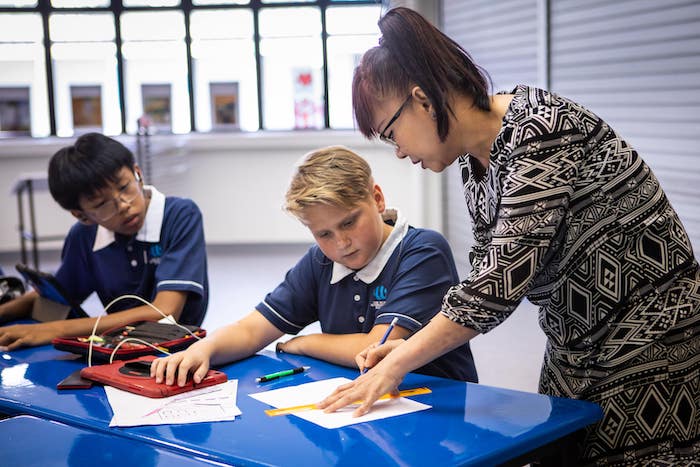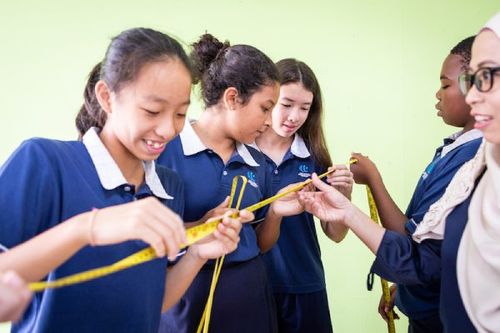Education: In the Beginning
Not so many years ago, education was a fairly simple thing. Government schools everywhere muddled along, continually constrained by local politics and economics. And private schools usually relied more on their name and status than their academic record.
Rote learning, memorisation and the so-called three R’s (Reading, Writing and Arithmetic) were the main focus of schooling. Academic success almost meant that you were qualified or had the skills to take on a clerical role in an organisation or government entity. Schooling was generic, and there had been little changed along the way, meaning education had become outdated. Schools were teaching the subjects that had been taught for years, and in order to make changes and add new content to the curriculum, a long, drawn-out process was involved.
But things have changed dramatically now.
With the era of cheap and accessible air travel, the prevailing family unit underwent a similar shift. Families started to do things together as a unit, and opportunities across the world were opened up. Way back in the ‘70s it was usual for the father to go away to work or travel to other places, to provide for the family. He would be the primary earner and would spend much of his time away from the family unit. When he was home, it was often the case that he wanted to relax and enjoy time with his family. The children were, in many cases, sent to boarding school, especially if the mother also worked outside the home. This was the norm for many children from a young age, even at pre-primary age. These children didn’t know any different and for them, going away for school was just part of everyday life. It was an accepted pattern.
But now the nuclear family tends to stay together, travelling in a unit to wherever need takes them. Children and families have become more adaptable. They are able to take these moves in their stride while still keeping in touch with friends and family back home due to the development of technology. In the past, the children’s education was of little import. If there was a school close by or one that had a decent reputation, that is usually where they were sent. But now it’s become of such significance that often opportunities in one city will be passed over in favour of another where the schools are better. Parents spend hours trawling through school brochures, attending visits, liaising with staff and speaking to other families. They are interested in results, fees, opportunities, facilities and safety. They want the best education for their children, and they are often willing to travel for this.
The Climate Today

Today there are a great many international schools, serving 4.5 million students with 420,000 teachers. And the demand is rising. Most of the students in these schools are from expat families working abroad: diplomats, professionals looking for an international experience and corporate managers taking on global roles. There are also families who live in the city already but wish for their children to have a more diverse and culturally rich education compared to the local schooling options. But such a proliferation of educational opportunity has given rise to some interesting observations.
It has now emerged that there’s a vast difference between these international schools, and not all schools are created alike. Some schools become lackadaisical in their education as they survive on reputation alone. They may charge high fees yet not provide the highest level of education. Other schools put a huge amount of importance on their teaching staff, facilities and opportunities. Their key goal is for children to have the best education possible and make it affordable at the same time. OWIS, for instance, has become a world-leading example because it’s affordable and produces consistently happy children who achieve high academic results. But there are a plethora of less-consistent alternatives out there.
So how and why has this happened? Is it simply that we’ve built our foundations on the solid bedrock of effective management and dedicated teachers? Indeed we have, but experts have realised that, in today’s climate, things have become more complex.
Trending Towards Educational Excellence
Professor Ralph Tabberer, ex-Director General of Schools at the UK Department for Children, Schools and Families (et al.), has spent his life involved with education and observes that “success is partly due to effective management: better-managed schools, carefully maintaining a clear vision and strong leadership, with quality teachers and plenty of professional development, and which build systematic solutions are considered to be the route to better outcomes.”
The Era of Co-Production

Parents who talk to their children about what they see, who read to them and who listen to their children read, who take their children on visits at weekends, and who know how to constructively praise them for effort rather than achievement, produce well-adjusted and successful offspring. And where parents, schools and students jointly take responsibility for education, such as with OWIS, student results get even better. This is what’s meant by ‘Co-Production’. Students who spend educational time with their parents have a stronger bond with them, and the relationship often becomes more supportive. Parents often also find that they are learning new things, and students enjoy teaching their parents. For instance, technology is rapidly progressing, and for some parents, they may not have the same skills that their children have. By spending time together, learning about this technology and allowing children to take on the ‘teacher’ role, their progress will be significantly increased.
Today, the successful school in Asia is focussing on and encompassing our multicultural global society, utilising the benefits of diversity, continually aiming for integration and, as a result of this harmony, achieving a high quality of education. Our school is at the forefront of this, and we genuinely believe that we are able to offer the best quality education, which creates truly global citizens of the future. We equip our children with the knowledge and skills, both academically and personally, which will help them follow their dreams and aspirations.
Christina O., who has children studying in primary and secondary grades at OWIS, says, “The school places the children first. The back to basics feeling of prioritising what matters, which forms the educational and social well being of all students attending OWIS, is a plus for me.”
Realistic Costing
But Professor Tabberer has one further observation. He’s discovered that very often the schools which levy the highest fees don’t produce the goods. In Dubai, for example, a significant number of the best-performers in international examinations charged fees that were one-third of the top-priced schools – and went on to state: “. . . moderate-fee schools, like OWIS, can be – and should be – just as effective at education as higher-fee schools and, in some cases, the schools can be even more effective. Why? Because schools and parents can learn how to merge quality with efficiency. I call this the ‘New Age of Enlightenment.’”
It is easy for parents to assume that a high price tag equates to high-quality education, but this is not always the case. It is important for parents to understand where their fees are going. Are they still paying for renovation projects that were done years before? Does the money go into teacher training and facilities? How much is spent on administration? These questions are all important, and parents should feel confident in asking schools for a breakdown of their fees. This is why at OWIS, we ensure that we offer full transparency of how we spend our fees. We are also able to provide parents with the choice to add on additional activities such as sports and hobbies if they wish so that they do not pay for classes that their children do not attend.
Effective Child-centred Education
This leaves little doubt that education has now entered an exciting new phase. Educational leadership is now the most significant factor in the bubbling hub of progressive schooling today, and the stress on being child-centric has never been more important – or as effective!
To know more about how One World International School personalises every student’s educational experience while building a community of interconnected learners, do contact us today.














